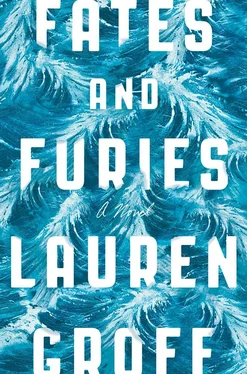“Probably,” she said.
“But Leo and I were able to extend our residency for two additional weeks. I’ll be back right before Christmas. And that’s a promise.”
“Nifty,” she said, and hung up, and when he called again and again and again for the third time, she wouldn’t answer.
—
IT IS NOT THAT HE FORGOT about the tiff with Mathilde, it was simply that when he went outside the sun had come out and the brightness against the snow and ice made the world seem as if carved of stone, marble, and mica, and the raw minerality of what had been so soft and fresh returned him to Go’s cave, as everything he saw and heard and felt now seemed urgently dovetailed to the world of Go. Two nights earlier, after dinner when it came time to share work, a video artist’s time-lapse hand-drawn movie of a village being built, being razed by fire, being rebuilt, seemed utterly right for their project, and necessary. Just as the puppeteer who was working with a fragment of fabric, who was able to make the piece of flaming silk into something movingly human, had a deep impression upon The Antigonad .
Lotto couldn’t forget his wife, but she existed on a constant, unchanging plane, her rhythms in his bones. At all moments, he could predict where she was. [Now, whipping eggs for an omelet; now, hiking over the crispy fields to the pond for an illicit smoke as she always did in her angry moments.] And Lancelot existed, right now, on a plane where everything he knew and was had been turned inside out, predictability had exploded.
He took a nap and woke to Leo sitting beside him on the bed. Last light of day flaring through the window, illuminating the pellucid skin, the fair eyelashes. The boy’s huge hand was warm on his shoulder, and Lancelot blinked sleepily, smiling, and there came the urge from the loyal doggish heart of him to press his cheek against it. So he did.
Leo flushed, and the hand twitched a little before he withdrew it.
Lancelot stretched to his full length, arms against the wall, feet dangling, and sat up. There was a smooth blue static in the room.
“I’m ready,” Leo said. “I want to write Go’s aria first. The love aria. Just the music for now. It’ll dictate the rest of the score. I’m going to disappear for a few days if that’s all right with you.”
“Don’t disappear,” Lancelot said. He felt a heaviness in him. “Can’t I sit quietly in the corner while you work? I’ll work on the sketch of the book a little more. And do a grammar and dictionary for Go’s language. I won’t bother you for a second. You won’t know I’m there.”
“Please. As if you could be silent for even an hour,” Leo said. He stood and went to the window, his back turned to Lancelot, who was fully awake now. “It would be good for us to be apart for a span,” Leo said. “For me, at least. To know you are here and not be able to see you. All of that would show up in the music.”
Lancelot looked at him with some wonder. He was so slight in the window, framed against the steely forest. “But Leo,” he said. “I’ll be lonely without you.”
Leo turned around and gave Lancelot a quick look and went wordlessly out the door, through the forest, up the path. Lancelot wrapped his blanket around his shoulders and came out to the porch to watch him disappear.
Later he took himself through the dark trees to the colony house for supper; but only a single light was illuminated in the kitchen, and of the eight artists still in residence, most were in warmer places, being loved and fed and touched on the shoulders, on the cheeks, by family and friends. Being loved. And Lancelot had chosen separateness. He would have acted differently had he known that Leo would turn hermit. It gnawed at him, the old discomfort of being left with only himself.
Lancelot heated his plate of gravied tofu and potato mash and green beans. Halfway through, he was joined by a smelly, half-deaf composer with a Walt Whitman beard that sopped up his dribbles. He had eyes pink with burst veins and mostly grunted, glaring at Lancelot like a ferocious goat. Lancelot made a game out of having a lopsided conversation with him.
“Cranberry sauce?” Lancelot said, ladling some out on his own plate, to a grunt.
“You don’t say? Best you ever had, at the Ritz on Thanksgiving day in 1932?” to a grunt.
“With whom?” Grunt. “Really? Marvelous. Royalty, did you say?” Grunt. “You did what with Princess Margaret during the war? I had no idea, man, that that was even invented back then.” Grunty-grunty-grunt.
For dessert there was pumpkin pie. Bumblefuck Pie. An entire one that they split, Lancelot shoving more sweet in to clog up his sadness, the composer matching him bite for bite as if in thrall to a ferocious sense of justice. Lancelot took an intentionally enormous bite to watch the composer mirror him. The man looked like a snake with a rat in its gob. When Lancelot swallowed, he said, “I like you, Walt Whitman.”
And the composer, who had heard this at least, spat, “Oh, you think you’re so funny,” and stood and left the dishes and the crumby floor to Lancelot to clean.
“You contain multitudes,” Lancelot said to his beetled back.
The composer turned, glared. “I’m giving thanks for you,” Lancelot said solemnly.
Oh, lonely, lonely. Mathilde didn’t answer at the house or at the apartment or on her cell, but of course she wouldn’t; she was hosting company. His family, his friends. They were all certainly talking about him. [Indeed.] He brushed his teeth terribly slowly and went to bed with a doorstop novel. Don’t be paranoid, Lotto, you’re fine, he told himself. And if they were talking about you, surely they’d be saying kind things. Yet he imagined them laughing at him, their faces contorted into grotesque animal forms, Rachel a rat, Elizabeth an elephant with her long, sensitive proboscis, Mathilde an albino hawk. Fraudster, ignoramus, space cadet, they were saying of him. Former male whore. Narcissist!
Now they were having a grand time without him, deep into their drinks. Throwing their heads back, pointy teeth and wine-stained gums, laughing and laughing. He tossed his book across the room so hard it cracked its spine on landing.
—
HE CARRIED HIS MOROSENESS with him through the night into the morning. By noon, he was actively longing for home. For God with her hot nose, for his own pillow, his own sweet Mathilde.
On the afternoon of the fourth day of Leo’s solitary confinement, Lancelot couldn’t help himself: he went the long way through the woods to have plausible deniability, gathering a dandruffy birch stick on his walk, and ended up outside Leo’s cabin again.
It took a moment to locate Leo in the dim inside. The boy had made a concessionary fire, too cold outside these days even for him. In the dull glow, his head was pressed against the piano’s forehead, and he could have been sleeping if not for the hand rising from his lap once in a while to strike a note or a chord. The noise after a long period of silence startled, even all the way out to Lancelot behind his tree.
It was calming, this slow noisemaking. Lancelot went into a very small trance each time he waited for the next note. When it came, it was muted by the walls and windows and pockets of air, and it arrived at Lancelot’s ear unexpectedly. It was like believing yourself alone in a room, beginning to fall into sleep, only to hear a sneeze muffled in the darkest corner.
He left when his shivering got uncontrollable. There was new bad darkness, a stormy one, fast descending out of the western sky. He skipped dinner for ramen noodles sucked from the styrofoam cup and hot chocolate, and finished off half a bottle of bourbon, dancing naked to a fire that blazed and popped and gave the room a mid-August Florida broil. He opened the window and watched the snow fall slantwise in and hit the floorboards as water, rebounding into mist.
Читать дальше












